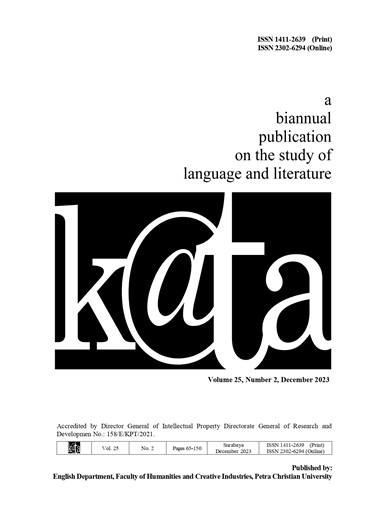A Study of Language and Identity as Neocolonial Means in Firoozeh Dumas’ Funny in Farsi
Abstract
The phenomenon of migration, whether by choice or necessity, has shaped various spheres, giving rise to a corpus referred to as migrant literature. Many authors of this genre explore the sociopolitical contrasts between their current and native lands, sharing their experiences while sometimes allegedly concealing some aspects of the immigration process. This has sparked contentious debates that extend beyond the literary realm. Firoozeh Dumas’ well-known memoir, Funny in Farsi, humorously portrays the Iranian-American family’s journey through cultural disparities. In an attempt to reappraise this light-hearted approach to Dumas’ work, this research utilizes Ngugi wa Thiong’o’s language studies and Milton Gordon’s analysis of identity in diaspora. This study concludes that the Englishness of Dumas’ memoir and its narrative’s normalization of assimilation in the host country, align with the neo-colonial politics of the West theorized by Kwame Nkrumah. These neo-colonial dynamics of power in turn can potentially disrupt the ongoing decolonization process.
Downloads
References
Ashcroft, B., Griffiths, G., & Tiffin, H. (2013). Post-colonial studies: The key concepts. New York: Routledge.
Barthes, R. (2016). The Death of the Author (pp. 141-145). Solent University. (Original Work Published 1967).
Belletto, S., & Keith, J. (Eds.). (2019). Neocolonial fictions of the global cold war. Iowa city: University of Iowa Press.
Berry, J. W., & Sam, D.L. (1997). Acculturation and adaptation. In J. Berry, M. Segall, & C. Kagitcibasi (Eds.), Handbook of cross-cultural psychology (Vol. 3), Social behavior and applications (pp. 291–326). Boston: Allyn & Bacon.
Betts, R. F. (1961). Assimilation and association in French colonial theory 1890–1914. New York: Columbia University Press.
Dumas, F. (2004). Funny in Farsi: A memoir of growing up Iranian in America. New York: Random House Trade Paperbacks.
Egeland, M. G. (2012). The process of identity in three immigrant memoirs [Master’s thesis, University of Oslo]. UiO: Duo Research Archives. http://urn.nb.no/URN:NBN:no-33502
Ghandeharion, A., & Farshi, S. S. (2017). Homi Bhabha and Iranian-American literature of diaspora: Is Firoozeh Dumas’s Funny in Farsi postcolonially funny? Forum for World Literature Studies, 9(3), pp. 489-504.
Golding, P., & Harris, P. (Eds.). (1996). Beyond cultural imperialism: Globalization, communication and the new international order. Thousand Oaks: Sage Publications
Gordon, M. M. (1964). Assimilation in American life: The role of race, religion, and national origins. New York: Oxford University Press.
Hoffman, D. M. (1988). Cross-cultural adaptation and learning: Iranians and Americans at school. In H. T. Trueba & C. Delgado-Gaitan (Eds.), School and society: Learning content through culture (pp. 163-180). Westport, CT: Praeger.
Karimzadeh, A., & Samani, E. (2022). Double consciousness-oriented linguistics practices among diasporic writers in two novels: To see and to see again and Funny in Farsi. Scientific Journal of Language Research, 14(42), pp. 203-217.
Kazarian, S. S., & Evans, D. R. (1998). Cultural clinical psychology: Theory, research, and practice. New York: Oxford University Press.
Moore, D. (2003). Review of the book Funny in Farsi by F. J. Dumas. Library journal, 128(6), p. 108.
Mottahedeh, N. (2004). Off the grid: Reading Iranian memoirs in our time of total war. Middle East Research and Information Project 9.
Naghibi, N. (2016). Women write Iran: Nostalgia and human rights from the diaspora. Minneapolis: University of Minnesota Press.
Nayar, P. K. (2015). The postcolonial studies dictionary. Hoboken, NJ: John Wiley & Sons.
Nkrumah, K. (1965). Neo-colonialism: The Last Stage of Imperialism. London: Nelson.
Ramin, Z. (2014). Iran, America and Iranian American community in Firoozeh Jazayeri Dumas’ Funny in Farsi. K@ta, 16(2), pp. 101-108. https://doi.org/10.9744/kata.16.2.101-108
Said, E. (2003). Orientalism. New York: Penguin Group. (Original Work Published 1978).
Sheikholeslam, F., & Varijkazemi, A. (2022). The social life of the Chador in contemporary Iran. Women Studies, 13(41), pp. 151-191. https://doi.org/10.30465/ws.2023.41821.3596
Sheth, F. A. (2022). Unruly women: Race, neocolonialism, and the hijab. Oxford University Press.
Wa Thiong’o, N. (1986). Decolonising the mind: The politics of language in African literature. Rochester: James Currey Ltd.
White, L. A. (2022). Culture. In Encyclopedia Britannica. https://www.britannica.com/topic/culture

This work is licensed under a Creative Commons Attribution 4.0 International License.
This work is licensed under a Creative Commons Attribution License


















